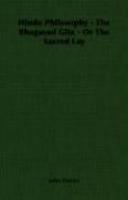
Book Summary
Text extracted from opening pages of book: HINDU PHILOSOPHY. THE BHAGAVAD GITA OR THE SACRED LAY. A SANSKRIT PHILOSOPHICAL POEM. & ran* lateto, toitfj BY JOHN DAVIES, M. A. ( CANTAB.) MEMBER OF THE ROYAL ASIATIC SOCIETY, OF THE CAMBRIDGE PHILOLOGICAL SOCIETY, LTC., AND ( SOMETIME) RECTOR OF WALSOKBN, NORFOLK FOURTH EDITION. LONDON: KEGAN PAUL, TRENCH, TRUBNER & CO. L* DRYDEN HOUSE, GERRARD STREET, W. 1907. The rights of translation and of reproduction arc reserved. CONTENTS. PAGB INTRODUCTION i TRANSLATION: READING I. THE DESPONDENCY OF ARJUNA 19 II. THE SANKHYA-YOGA ( DOCTRINE) . . . 32 III. DEVOTION BY WORK 47 IV. THE DEVOTION OF KNOWLEDGE 58 V. DEVOTION BY RENOUNCING WORKS .... 68 VI. DEVOTION BY SELF-RESTRAINT 75 VII. DEVOTION THROUGH SPIRITUAL DISCERNMENT . . 86 VIII. DEVOTION TO THE SUPREME ETERNAL BRAHMA . 94 IX. DEVOTION THROUGH THE ROYAL KNOWLEDGE AND THE ROYAL MYSTERY IO2 X. DEVOTION BY THE DIVINE PERFECTIONS . . . IIO XI. THE MANIFESTATION OF THE UNIVKRSAL FORM . 1 2O XII. THE DEVOTION Ob 1 WORSHIP . . . . . 1 3 XIII. DEVOTION BY THE SEPARATION OF MATTER AND SPIRIT 136 XIV. DEVOTION BY SEPARATION FROM THE THREE MODES 144 XV. DEVOTION IN ATTAINING TO THE HIGHEST BEING . 150 vi CONTENTS. BEADING PAGE XVI. DEVOTION WITH REGARD TO THE SEPARATE STATE OF GODS AND ASURAS 155 XVII. DEVOTION BY THE THREEFOLD KINDS OF FAITH . l6l XVIII. DEVOTION IN DELIVERANCE AND RENUNCIATION . l68 APPENDIX. I. ON THE DATE AT WHICH THE BHAGAVAD GITA WAS PRO BABLY WRITTEN, AND ON THE THEORY THAT IT WAS WRITTEN UNDER AN INFLUENCE DERIVED FROM A KNOWLEDGE OF CHRISTIAN DOCTRINES . . . l8l II. THE TRADITIONARY LINE OF DESCENT OF THE LUNAR DYNASTY 202 III. COLLATION OF TWO MSS. WITH THE BONN EDITION OF THEBHAGAVAD GlTA, AND THE READINGS OF OTHKR EDITIONS AND MSS. . .... 204 INTRODUCTION. THE Bhagavad Glta is a poem, written in the usual verse form of the Hindu epic poem and is an episode in the sixth book, or Bhlshma Parvan, of the Mahabharata, an epic poem devoted mainly to the deeds of the rival princes, who, though descended from a common ancestor, Kuril, fought as Kauravas and Pandavas for the kingdom of which Hastinapura was the capital. The facts which pre ceded the opening scene of the poem are briefly these: Dhritarashtra and Pamjlu, the sons of Vyasa, were brought up, after the death of their father, by their uncle Bhlshma, who carried on, in their minority, the government of Hastinapura. Dhritarashtra was the first-born, but being blind, he renounced the kingdom in favour of Pandu. The former married Gandharl, daughter of Subala, king of Gandhiira, and had one hundred sons, of whom Dur yodhana was the eldest. Pandu married Kuntl, also called Pritha, the daughter of a Yadava prince, Sura, who gave her in charge to his childless cousin, Kuntibhoja. She bore three sons, Yudishthira, Bhlina, and Arjuna; the eldest ( Yudishthira), being born before Duryodhana, was installed by Dhritarashtra as Yuvaraja, or heir-apparent, 1 * Other traditions represent that a tarftshtra, and to Yudhishthira was compromise was subsequently made, given a territory of which Indra by which the kingdom of Hastinii-prastha, on the river Yamuna, was pura was given to the sons of Dhri-the capital. A 2 INTRODUCTION. and soon distinguished himself by his warlike exploits, in which his brothers assisted him. The renown which the Pandu princes acquired excited in Dhritarashtra and his son Duryodhana a jealousdesire to supplant them. The latter formed a plan to destroy them by setting fire to their house, and to obtain the throne for himself. This plan failed, and then he plotted with a skilful dice-player, called akuni, to take advantage of Yudishthira's love of gambling, and by leading him to stake his kingdom, to win it from him. Dhritarashtra was induced to call an assembly ( sabha) at Hastinapura, which the Pandavas were invited to attend. They came, and Duryodhana persuaded Yudishthira to play with Sakuni. He consented, and in the excitement of the game he s
Book Details
| Book Name | Hindu Philosophy - The Bhagavad Gita - Or The Sacred Lay |
| Author | John Davies |
| Publisher | Davies Press (Mar 2007) |
| ISBN | 9781406767421 |
| Pages | 212 |
| Language | English |
| Price | 1373 |








